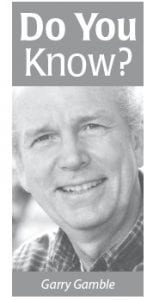Considered one of the 25 greatest pianists of all time, 86-year-old Austrian pianist, poet and author Alfred Brendel – largely self-taught after the age of 16 – performed with major orchestras around the globe, including 81 performances at Carnegie Hall, one of the most celebrated venues in the world located in Midtown Manhattan in New York City.
Alfred certainly understood nuance, both in the delivery of musical composition, as well as the subtleties of word configuration. He astutely pointed out that “The word ‘listen’ contains the same letters as the word ‘silent’.”
Thought-provoking isn’t it?
Permit me to juxtapose these same two words another way: While we all claim that we “listen,” we belie this declaration by too often remaining “silent.”
Just try showing up for the public comment period offered at the beginning of regular county commissioner meetings.
As a commissioner, I was never comfortable buttressed behind our imposing wooden thrones, as members of the community rallied the confidence to “come before the board” laying bare their soul to a group that responded by remaining silent . . . except for the “transaction” smiles and words that carried the “lightweight” of pretension.
And while public comment policy allows an individual five minutes to be heard – when the room isn’t overcrowded with citizens wishing to speak – time is often rationed to two minutes… I assume to get on with “more important” things.
Josh Stearns, associate director, Public Square Program at the Democracy Fund, observes, “We often talk about community engagement, but to what end? Engagement is a means to building more meaningful relationships with our communities, relationships rooted in trust, empathy, transparency and accountability …sometimes in a relationship we just need to listen because someone else needs to be heard. Listening for the sake of listening, for the sake of showing up and being present for others, is critical to building trusting relationships.”
Crowdsourcing pioneer and founder of GroundSource—an organization focused on transforming one-way communications into rich conversations, building a loyal and trusting community in the process, Andrew Haeg counsels, “The mix of trusted institutions might be different in your community. But the point remains the same: People will talk about hard things when someone’s listening and when they believe they can make a difference, even in a small way.”
American author Marjorie Kellogg, who began her career as a copy editor for the San Francisco Chronicle, expressed the frustration of many when she voiced, “You seldom listen to me, and when you do you don’t hear, and when you do hear you hear wrong, and even when you hear right you change it so fast that it’s never the same.”
Katherine Viner, writing in a July 2016 article in The Guardian, “How Technology Disrupted Truth,” “Instead of strengthening social bonds, or creating an informed public, or the idea of news as a civic good, a democratic necessity, [news] creates gangs, which spread instant falsehoods that fit their views, reinforcing each other’s beliefs, driving each other deeper into shared opinions, rather than established facts.”
Laurenellen McCann, who, for just shy of a decade, has focused on increasing equitable access to information and public participation in civic life, maintains, “Active listening is the art of focusing: lending your full attention to what a person or a bunch of people have to say and how they say it before responding. It’s both a skill and a series of practices.”
I maintain listening takes courage because you may hear something you don’t want to hear.
The “cerebral” pianist Alfred Brendel once said of Swiss classical pianist and conductor Edwin Fischer – 45 years Brendel’s senior and regarded as one of the great interpreters of J.S. Bach and Mozart during the 20th century: “His playing of slow movements was full of an unselfconsciousness beside which the music-making of others, famous names included, seemed academic or insincere. With Fischer, one was in more immediate contact with the music: there was no curtain before the soul when he communicated with the audience.”
I have come to appreciate the truth of Brendel’s words, “unselfconsciousness” and “no curtain before the soul” as I listen to my 97-year-old father’s words.
When words become few, are harder to express, their delivery halting, often faint and inaudible, are expressed more through the eyes than with the lips …we should lean in and listen more intently. These words are not cloaked in self-consciousness, there is no curtain that hides the soul, no pretension, no bias, no ulterior motive …these words are not tainted with guile or treachery. These words simply, yet powerfully, declare …to be known as you are …and valued all the more for the authenticity.
I do not want to lose the meaning of such words.
I mine for wisdom, I see more clearly the perspective in which life’s decisions were made, understand more deeply the weight of responsibility, the loyalty, the commitment, the perseverance …all enlarge my capacity to appreciate, to value, to love and, yes, my willingness to listen.
“The most basic of all human needs is the need to understand and be understood. The best way to understand people is to listen to them.”
~ Ralph G. Nichols
Former Cook County Commissioner Garry Gamble is writing this ongoing column about the various ways government works.



Loading Comments